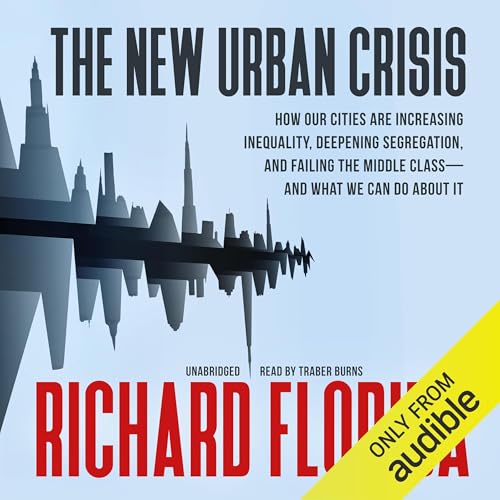
The New Urban Crisis
How Our Cities Are Increasing Inequality, Deepening Segregation, and Failing the Middle Class - and What We Can Do About It
No se pudo agregar al carrito
Add to Cart failed.
Error al Agregar a Lista de Deseos.
Error al eliminar de la lista de deseos.
Error al añadir a tu biblioteca
Error al seguir el podcast
Error al dejar de seguir el podcast
Prueba gratis de 30 días de Audible Standard
Compra ahora por $19.10
-
Narrado por:
-
Traber Burns
-
De:
-
Richard Florida
In recent years the young, educated, and affluent have surged back into cities, reversing decades of suburban flight and urban decline. And yet all is not well, Richard Florida argues in The New Urban Crisis. Florida, one of the first scholars to anticipate this back-to-the-city movement in his groundbreaking The Rise of the Creative Class, demonstrates how the same forces that power the growth of the world's superstar cities also generate their vexing challenges: gentrification, unaffordability, segregation, and inequality. Meanwhile, many more cities still stagnate, and middle-class neighborhoods everywhere are disappearing. Our winner-take-all cities are just one manifestation of a profound crisis in today's urbanized knowledge economy.
A bracingly original work of research and analysis, The New Urban Crisis offers a compelling diagnosis of our economic ills and a bold prescription for more inclusive cities capable of ensuring growth and prosperity for all.
PLEASE NOTE: When you purchase this title, the accompanying reference material will be available in your Library section along with the audio.
©2017 Richard Florida (P)2017 Blackstone Audio, Inc.Los oyentes también disfrutaron:




















Las personas que vieron esto también vieron:





Lacking in equity analysis
Se ha producido un error. Vuelve a intentarlo dentro de unos minutos.
Important Issue
Se ha producido un error. Vuelve a intentarlo dentro de unos minutos.
Moderately interesting - but nothing new
Se ha producido un error. Vuelve a intentarlo dentro de unos minutos.
Good story but
Se ha producido un error. Vuelve a intentarlo dentro de unos minutos.
I agree with his assessment 70%, the 30% I see differently. But overall the book is good.
Information
Se ha producido un error. Vuelve a intentarlo dentro de unos minutos.


